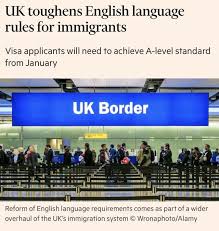Understanding the Migrant English Language Requirement

Introduction
As the UK continues to navigate its post-Brexit immigration landscape, the migrant English language requirement has emerged as a pivotal aspect of the immigration process. This requirement is essential not only for integration into society but also for contributing to the UK economy and culture.
Implementation of the Requirement
The migrant English language requirement mandates that individuals seeking to live and work in the UK demonstrate a certain level of proficiency in the English language. This measure, formalised in various immigration routes including skilled worker visas, student visas, and family reunification, is designed to ensure that newcomers can actively participate in both the workforce and the community.
According to the UK Home Office, applicants must prove their English language skills through recognised tests, such as IELTS or by holding a degree taught in English. This has heightened the importance of English proficiency, making well-structured educational resources and language classes more critical than ever before.
Current Developments
Recent government statistics indicate that over 70% of visa applications fulfilled the English language requirement in the past year, showcasing the preparedness of migrants entering the UK. However, criticism has surfaced from various advocacy groups claiming that the requirement can be a barrier for many, particularly for asylum seekers or those from non-English-speaking countries. Concerns over accessibility and affordability of language education have prompted calls for the government to reconsider support for language training initiatives.
Conclusion
As the Home Office reviews its policies to enhance community integration and economic participation, the migrant English language requirement will continue to be a focal point. In forecasts, the government is expected to implement additional support systems to aid those struggling with language proficiency. Understanding and adapting to this requirement is crucial for prospective migrants aiming to build a successful and stable life in the UK. For citizens and community organisations, championing inclusive language programs will be vital in ensuring that all newcomers can thrive.









